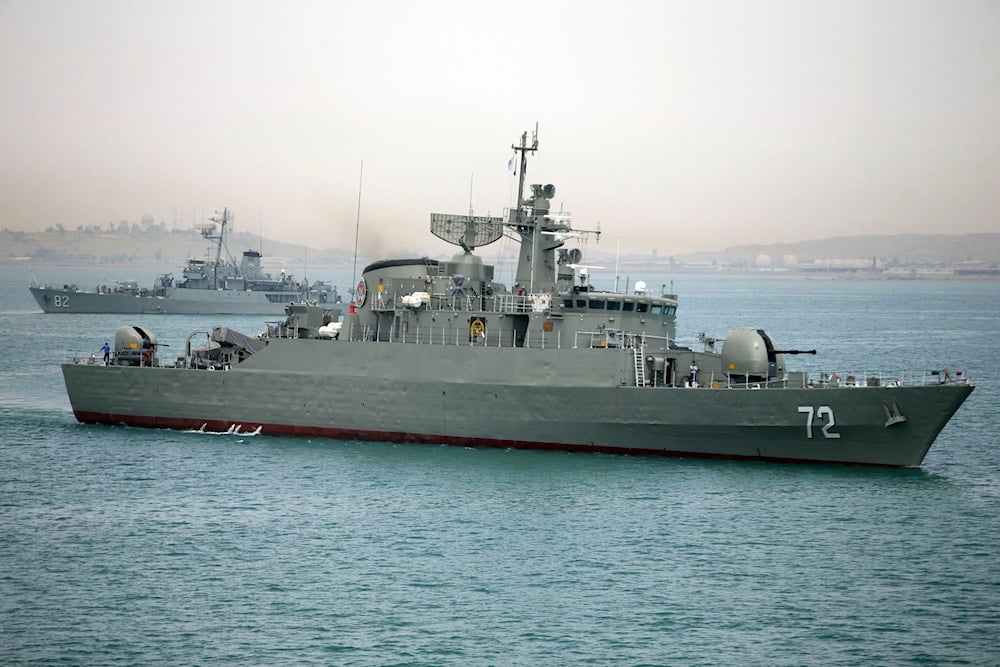Iran's deployment of warship 'boldest move yet' in the face of US
The Iranian Foreign Minister on Monday confirmed that Iran's response would be to continue to support “the will and desire of the Yemeni people."
-

Iranian warship Alborz prepares to leave Iran's waters on April 7, 2015 (AP)
Iran's deployment of a warship to the Red Sea is "its most daring action" yet to defy US forces in the vital commerce route in support of the Yemeni Armed Forces' operations.
An advanced destroyer belonging to the Iranian Navy entered the Red Sea through Bab al-Mandab Strait on Monday, Tasnim reported earlier Monday.
The warship Alborz is part of Group 94 of the Navy and is equipped with long-range cruise missiles, as reported by Mehr News Agency. It is considered one of Iran's formidable defense destroyers currently deployed.
Tasnim further noted that the Iranian military vessel has carried out its regular mission of maintaining maritime security, combating pirates in high seas, and other tasks since 2009.
Kevjn Lim, a "Tel Aviv"-based analyst at S&P Global Market Intelligence, said Iran is not showing "a willingness to deescalate, so we’re likely to see further targeting of commercial assets and US maritime ships going forward."
Some of the largest shipping firms have stopped sailing through the Suez Canal, rerouting around the Cape of Good Hope and exacerbating delivery delays between Europe and Asia.
Dina Esfandiary, a London-based senior advisor for the Middle East at the International Crisis Group, referred to the martyrdom of Ansar Allah fighters in the last days and expressed there was a "real risk of escalation," since the YAF "have made it clear they are not afraid to follow through on their threats.”
Brigadier General Yahya Saree, the YAF's spokesperson, announced that the YAF successfully struck Maersk Hangzhou with three anti-ship missiles, after its crew refused to head to the warnings of the Yemeni Navy, and abruptly changed course.
West cares more about trade disruptions than Palestinian lives
Iran's Foreign Minister, Hossein Amir-Abdollahian, lambasted the West on Monday, accusing the US and its allies of worrying more about global trade disruptions than Palestinians killed by "Israel's" war on Gaza.
Amir-Abdollahian's remarks came after a meeting with Mohammed Abdulsalam, a key official in Ansar Allah, and meetings with UK Foreign Secretary David Cameron on Sunday, who urged him Tehran needed to stop Ansar Allah.
The Iranian Foreign Minister responded that Iran would continue to support “the will and desire of the Yemeni people."
Furthermore, traders believe that any interruption within the Strait of Hormuz would pose a greater risk.
According to Callum Bruce, a London-based analyst at Goldman Sachs Group Inc., a hypothetical blockage of the Strait of Hormuz could cause crude prices to rise 20% within a month and maybe higher afterward. However, he believes such a situation is improbable since it would certainly elicit a more powerful global response.
UK preparing to participate in US-led aggression on Yemen
Further escalating the matter, The Times reported on Sunday citing sources that the UK is preparing to join the United States and other Western countries to launch a series of air aggressions on Yemen or Yemeni-affiliated targets in the Red Sea.
Last November, the British government announced that it had dispatched the Royal Navy ship HMS Diamond under the pretext of "reinforcing regional security" in the Gulf and the Indian Ocean.
According to the insider speaking to the newspaper, the synchronized attacks might see the participation of RAF warplanes for the inaugural time or the involvement of HMS Diamond.
The news site quoted the British Defense Secretary as saying that if Ansar Allah continues "to threaten lives and trade, we will be forced to take the necessary and appropriate action.”
According to the sources, The Times report claimed that Grant Shapps' comments were a "last warning" if Sanaa does not stop conducting operations, noting that the Western response would likely be “limited” but “significant”.

 4 Min Read
4 Min Read








